What do parrots eat?
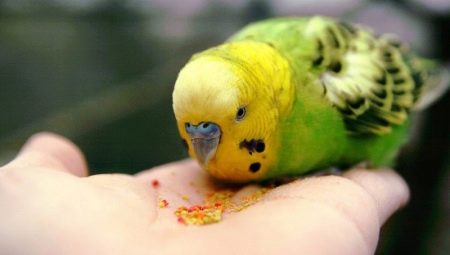
A parrot is a small bird with a bright color of feathers. Under natural conditions, it feeds on seeds, sweet fruits, berries, as well as the buds of shrubs and trees. Nowadays, many people have these beautiful and vociferous pets in their apartments and houses. Therefore, it is so important to properly feed the parrot, take care of it and look after it.
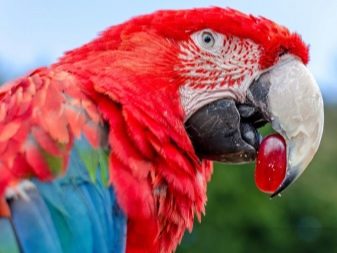
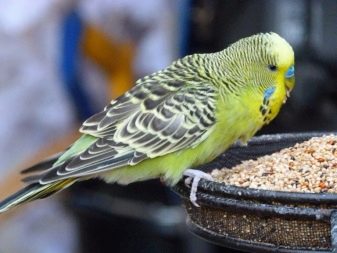
Feeding rules
Being in captivity, the bird does not have the opportunity to choose its own diet, therefore, a person must provide the parrot with such food, which will contain all the necessary substances for its normal life. It is not worth saving on feeding your pet, because a poor-quality product can be harmful. One of the best options for feeding your parrots in your home environment is a commercially available grain mix. The main thing is that it is of high quality, a good reputation and properly packaged. Such a product will help to feed the bird correctly, since it is as close as possible to healthy food that parrots eat in the wild. However, like other living things, this bright pet wants a varied diet in order to receive not only taste pleasure, but also saturate the body with additional vitamins and minerals.
So that the food does not end unexpectedly, it is worth buying it with a margin, however, you can also feed your pet with some products that are available at home. In specialized stores, you can buy feed with a single-component and multi-component composition.The owner should know that the chick will not be able to swallow food intended for an adult parrot, so they should be fed with special crushed mixtures of cereals, seeds, fruits, foliage and honey. In order for a pet to grow up healthy, the owner must know whether he loves the same food, or prefers a constant change of products.
An important nutritional rule is the presence of wet, cooked and dry food in the bird's diet. The pet should not be hungry, so it is worth knowing and controlling how much feed it needs per day. If the bird is small, then a one-time portion for it is 18 grams, and additional treats are 4 grams. With an average size of a parrot, the portion of food should be no more than 32 grams, and treats - 7 grams. If the bird is large, then at one time it eats 90 grams of food, and in addition it can be treated with 20 grams of food.
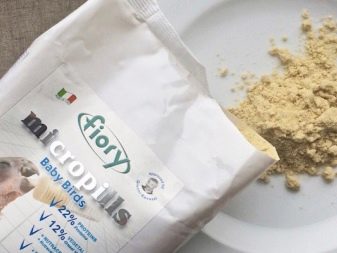
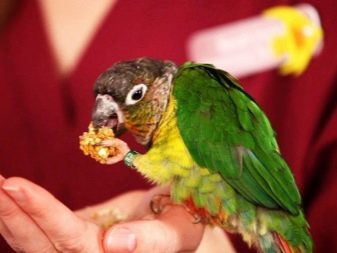
Types of feed
If the diet of parrots is composed correctly, then the pets do not get sick, and their appearance is characterized by purity, beauty and attractiveness. Bird food can be of several types.
- Dry... These include a mixture of cereals, germinated seeds, vitamins and additives.
- Juicy... This type of food for feeding a parrot includes fruits, vegetables, herbs.
Clean water is an important part of a pet's nutrition. Drinking bowls should be changed daily, even if there is still water in it. Feathered pets can shake out some dandruff and powder, which can contaminate the water. You can use ordinary tap water, also bottled, but it is not recommended to pour distilled water into the bird.
Vitamins and bird feeding are minerals in the form of pebbles and mixtures purchased in the store. These additions can make your pet's lunch complex, rich and healthy. Sepia has become very popular recently. With its help, the parrot is engaged in grinding the beak, thereby preventing its deformation. Mineral stones consist of a significant percentage of Ca, P, Mg, Fe, Zn. In specialty stores, you can buy goods that contain a significant amount of charcoal, limestone, chalk, coral, seashells, clay, sand. Granulated feed has a certain cereal, vegetable, vitamin and mineral composition. The basis of this product is corn flour in combination with other components.
The owner must know that the feathered pet should not be given food that is intended for another animal, as its components can cause disastrous consequences.
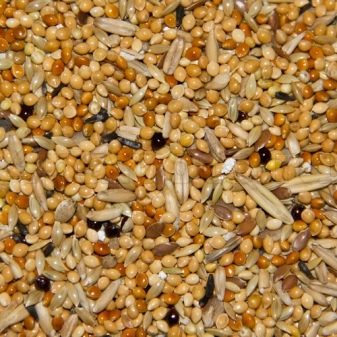
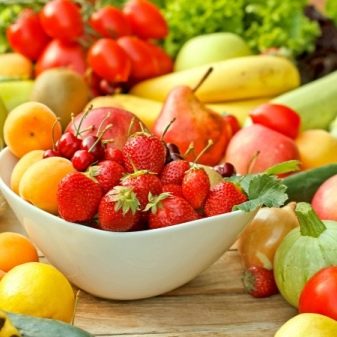
Do they eat meat?
Some species of birds eat animal food, but there are those that do not need it. The presence of meat in the diet of parrots is not considered necessary. The owner can offer the bird meat as a treat. Animal products can be given infrequently and little by little.
Alternatively, a bone will do with the remaining pieces of pulp on it.
Grains and seeds
The poultry diet should include feeds that are capable of saturating the body with everything that is important and necessary for its optimal functionality. Otherwise, the feathered friend can get sick. The basis of food for parrots, which is kept at home, is considered to be a grain mixture, which is purchased at the store. This is the most economical feeding option, because very little is needed to saturate the parrot.
When purchasing finished products, you should carefully consider its choice. The feed must be of a high quality level and hermetically sealed. Solid mixtures should contain components that parrots love very much:
- millet - 60%;
- oats - 20%;
- sunflower seeds - about 15%;
- other grains and seeds, such as hemp, flax, canary grass.
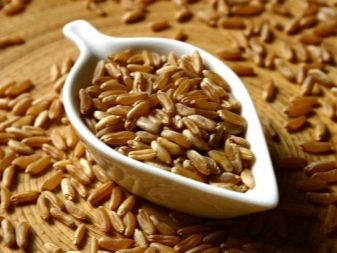
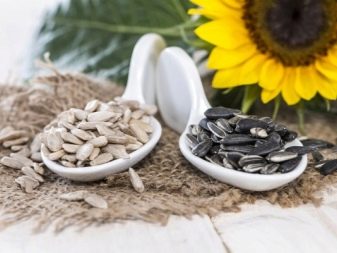
Sesame seeds, wheat groats, poppy seeds, pumpkin seeds, dry corn, buckwheat, millet are also suitable for feeding these bright pets. Chumiza is considered one of the best grain food options for a parrot.The owner must monitor the quality of food he gives to his pet. If the grain mixture has mold, or spoiled seeds come across, then you should not give it to the parrot. Seeds, like grains, must be clean and fresh.
Eating germinated seeds is especially beneficial for the parrot. The owner can prepare this type of food on his own. This product can be stored for no more than two days and only in the refrigerator. Steps for preparing germinated seeds:
- it is necessary to select high-quality grains, for example, oat, wheat or hemp;
- wash the product thoroughly with clean water;
- place the seeds in a bowl and soak in warm water;
- the container is covered with clean gauze;
- prepared grains should be left alone and monitored for readiness.
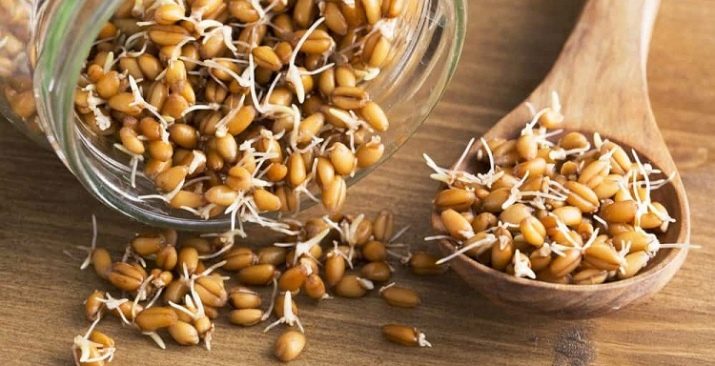
Nuts
Most parrots love nuts, but because of their high fat content, they should be given to the bird as a treat. This product should not be salted, it can be eaten by people. You can not treat the bird with walnuts, cashews, macadamias fresh, as they have a toxic shell.
Parrots are shown eating the following types of nuts:
- almonds;
- cashew;
- coconut flakes;
- hazelnuts;
- peanuts;
- cedar;
- pecan;
- pistachios;
- walnut.
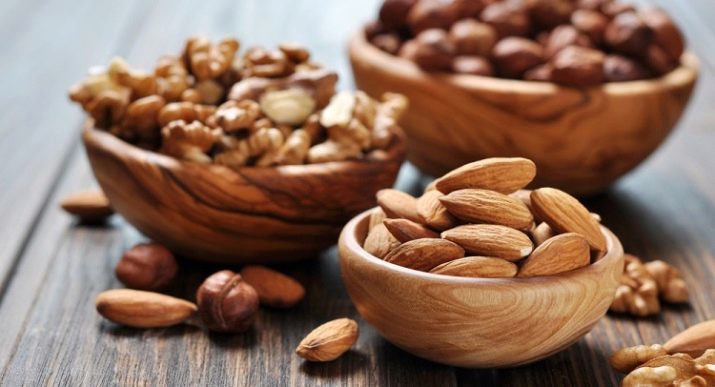
Can I feed fruit?
As an addition to the main diet, the bird should receive fruits and berries. Each of the fruits should be thoroughly washed before serving, to get rid of the peel and dirt. For flamboyant birds, serve fruit treats as sweet treats.
- Sweet cherries, plums, cherries... You can treat them to a feathered friend only washed and pitted.
- Rose hip... This berry is considered useful, the parrot can eat it fresh and boiled.
- Watermelon causes a laxative effect on the pet's body, which is why it should not be given a lot. Only pulp with seeds is given from watermelon.
- Currants, victoria, sea buckthorn, cranberries, lingonberries, blueberries, raspberries, mountain ash. The parrot can eat these products dry and fresh.
- Grape requires thorough washing before serving.
- Kiwi, bananas... Parrots are treated to only the soft portion of these peelless fruits.
- Garnet it is considered beneficial if the bird does not eat it in excess. In a situation where the pet has hepatic ailment, the fruit should be discarded.
- Apples, pears... Apple is a fruit that contains iron and vitamin C, while pears are high in fiber. Of these products, the bird should be fed only the pulp without seeds and skin. The seeds of these foods can harm your pet's body.
The gastrointestinal tract of a parrot does not react well to tannic acids, essential oils, which is why it is forbidden to treat a bird to mango, avocado, persimmon and papaya. It should also be pampered with oranges, nectarines, peaches, pitted tangerines. When introducing tangerines into the diet, it should be done gradually, for example, as a vitamin supplement. When buying fresh fruits, you should pay close attention to their appearance.
It is better to replace products with a pale color with bright orange ones, they contain carotene, which saturates the body with vitamin A.
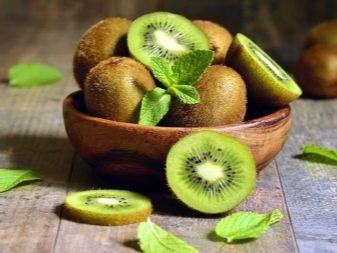
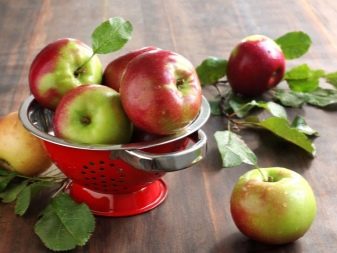
Do I need to give vegetables?
To balance the nutrition of parrots, it is worth feeding them vegetables, herbs.
- Carrot quite useful, its presence in the diet of a bird is simply necessary due to the high content of vitamin A. Carrots are given fresh, while they should be cut into slices or rubbed. Alternatively, you can grate it and serve it along with a boiled egg or breadcrumbs.
- Melon, pumpkin... These foods are rich in vitamins, therefore they are considered an important element of nutrition for a parrot. In addition to useful elements, in these melons and gourds there is an optimal sugar dose, all this helps the parrot's body to grow healthy. Melon and pumpkin seeds are also rich in vitamins. Vegetables should be given to your pet raw and chopped.
- Zucchini, squash Are vegetables with a high vitamin content.They are also rich in fiber, which has a beneficial effect on the digestive system of the bird.
- Cucumbers... This green vegetable is high in vitamin E and can be used as a source of fluids. It is worth noting that a cucumber grown using chemicals can harm a parrot, so you should give up low-quality products.
- Tomatoes... Eating a red vegetable is an opportunity to fill the body with vitamins C and B. And they also have a lot of fluid, so the vegetable replenishes the lack of water in the body. The parrot loves to eat not only the soft part of the tomato, but also its seeds, which contain many useful elements.
- Cabbage leaf - a storehouse of numerous micro - and macronutrients, vitamins, which is why they need to feed their pet. It is categorically impossible to give the parrot a cabbage petiole, since the substances contained in it can cause irreparable harm to the parrot.
- Bulgarian pepper. This vegetable can also be eaten by a parrot, but only sweet varieties.
- Broccoli - Recommended vegetable for pet food. Before serving, it should be kept in boiling water for up to 5 minutes.
Greens in a variety of forms provide significant benefits to parrots. The best option for a parrot is considered greenery, which is grown in the garden or in the garden, you can treat it with buds from trees, bushes, plantain and dandelion greens. Before feeding the pet with greens, it is worth scalding it with boiling water and thoroughly washing out each leaf. Parrots love beet tops, parsley, spinach.
The rich green color has a beneficial effect on the body of the parrot, which is why vegetables and greens should be served to your pet constantly. In this case, the amount of vegetables in the diet should exceed fruit.
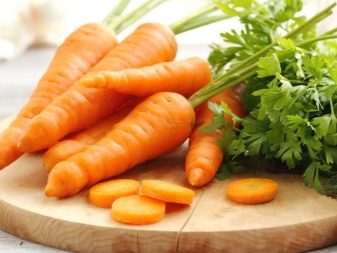
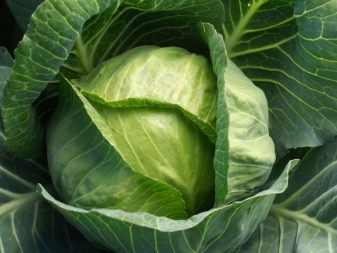
What should not be fed to parrots?
Despite the need for variety in the poultry diet, there are foods that they are strictly forbidden to eat. The owners should remember that the bird cannot be fed with dishes prepared for themselves, since, for example, vegetables from the soup contain salt and fat, which are contraindicated for it.
Prohibited foods include the following:
- mango, papaya, avocado;
- rhubarb, sorrel;
- mushrooms, eggplants;
- potato;
- spices;
- soybeans, raw red beans;
- onion garlic;
- bread;
- chocolate;
- alcohol;
- caffeine;
- sweets and salty foods;
- a fish;
- mushrooms;
- green tomatoes;
- cheese.
And also do not feed the parrots from your mouth, because in this way you can transfer harmful microbes and fungi to the pet, which are safe for humans, but very harmful for the bird. Despite the fact that the parrot is unpretentious in food, its nutrition should be taken with extreme caution and care.
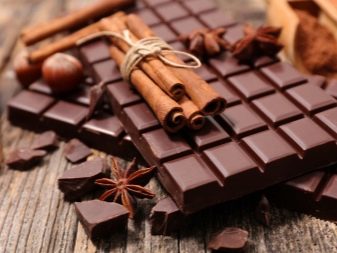
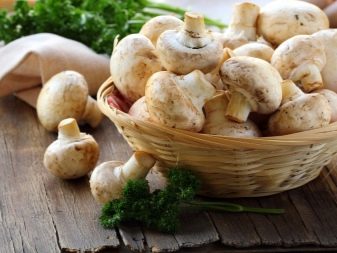
The main rule when drawing up a diet is harmlessness and variety.
For information on how to feed the budgerigar, see the next video.








